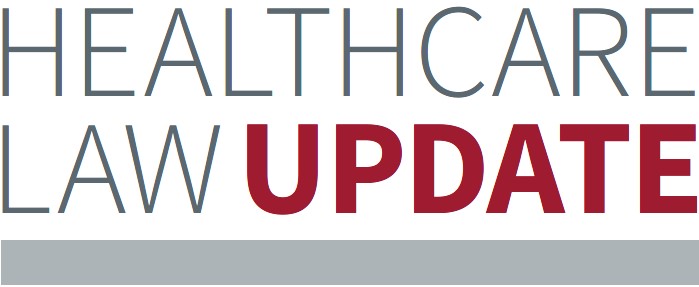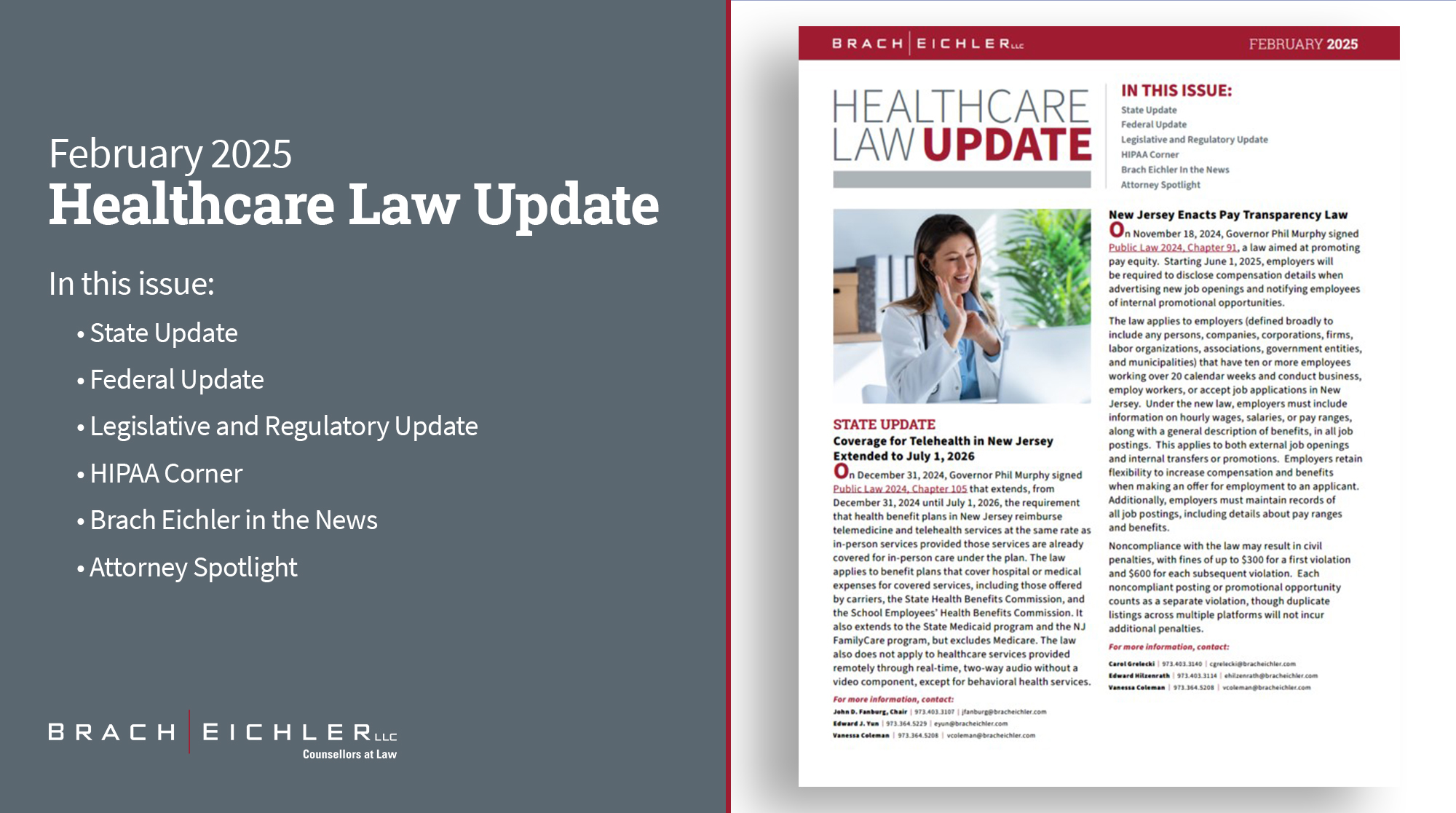


On December 31, 2024, Governor Phil Murphy signed Public Law 2024, Chapter 105 that extends, from December 31, 2024 until July 1, 2026, the requirement that health benefit plans in New Jersey reimburse telemedicine and telehealth services at the same rate as in-person services provided those services are already covered for in-person care under the plan. The law applies to benefit plans that cover hospital or medical expenses for covered services, including those offered by carriers, the State Health Benefits Commission, and the School Employees’ Health Benefits Commission. It also extends to the State Medicaid program and the NJ FamilyCare program, but excludes Medicare. The law also does not apply to healthcare services provided remotely through real-time, two-way audio without a video component, except for behavioral health services.
For more information, contact:
John D. Fanburg, Chair | 973.403.3107 | jfanburg@bracheichler.com
Edward J. Yun | 973.364.5229 | eyun@bracheichler.com
Vanessa Coleman | 973.364.5208 | vcoleman@bracheichler.com
On November 18, 2024, Governor Phil Murphy signed Public Law 2024, Chapter 91, a law aimed at promoting pay equity. Starting June 1, 2025, employers will be required to disclose compensation details when advertising new job openings and notifying employees of internal promotional opportunities.
The law applies to employers (defined broadly to include any persons, companies, corporations, firms, labor organizations, associations, government entities, and municipalities) that have ten or more employees working over 20 calendar weeks and conduct business, employ workers, or accept job applications in New Jersey. Under the new law, employers must include information on hourly wages, salaries, or pay ranges, along with a general description of benefits, in all job postings. This applies to both external job openings and internal transfers or promotions. Employers retain flexibility to increase compensation and benefits when making an offer for employment to an applicant. Additionally, employers must maintain records of all job postings, including details about pay ranges and benefits.
Noncompliance with the law may result in civil penalties, with fines of up to $300 for a first violation and $600 for each subsequent violation. Each noncompliant posting or promotional opportunity counts as a separate violation, though duplicate listings across multiple platforms will not incur additional penalties.
For more information, contact:
Carol Grelecki | 973.403.3140 | cgrelecki@bracheichler.com
Edward Hilzenrath | 973.403.3114 | ehilzenrath@bracheichler.com
Vanessa Coleman | 973.364.5208 | vcoleman@bracheichler.com
On December 12, 2024, the New Jersey Office of the State Comptroller (OSC) issued a report detailing the OSC’s five year investigation of for-profit nursing home South Jersey Extended Care (SJEC). The investigators uncovered an alleged scheme where the operators and owner of SJEC siphoned Medicaid funds from SJEC into their personal businesses, leaving SJEC without adequate staffing and resources.
Michael Koning, an individual barred from operating nursing homes in Connecticut and Massachusetts, and his brother-in-law Steven Krausman, ran the home. The official owner of SJEC, Mark Weisz, was simply a straw owner of SJEC and surrendered control to Koning and Krausman. During the investigation period, OSC discovered that SJEC received $35.6 million in Medicaid funds but paid $38.9 million to businesses owned and controlled by Koning and Krausman. To prevent fraud, federal and state laws require nursing homes to disclose transactions with vendors that have common ownership or control with the nursing home and place a cap on costs paid to such related parties. However, with Weisz as the straw owner, Koning and Krausman evaded exposure of their scheme by acting as independent parties. Koning, Krausman, Weisz, SJEC and their related entities and parties have been suspended from New Jersey Medicaid.
In light of the investigation, the OSC also made recommendations to other regulatory agencies in its report to prevent and detect fraud, waste, and abuse within the Medicaid Program. Recommendations include (i) the Department of Health (DOH) adopting regulations to minimize the risk associated with complex corporate structures used by for-profit nursing homes, (ii) prohibiting nursing home owners/operators from withdrawing equity from nursing homes without approval of DOH and the Department of Human Services (DHS), and (iii) DOH and DHS approving all leases, transfers of ownership, and mortgages involving nursing home properties.
For more information, contact:
Riza I. Dagli | 973.403.3103 | rdagli@bracheichler.com
Edward J. Yun | 973.364.5229 | eyun@bracheichler.com
Cynthia J. Liba | 973.403.3106 | cliba@bracheichler.com
On January 7, 2025, the Consumer Financial Protection Bureau (CFPB) published a final rule that prohibits medical debt from being included on credit reports. Under the new rule, credit reporting agencies will be prevented from including medical debt in an individual’s credit report and lenders will not be permitted to use medical information in determining whether to extend credit. The rule also restricts credit reporting agencies from furnishing reports to creditors containing medical debt information that creditors are barred from using.
The final rule is set to become effective in March, although it is expected that the rule will be challenged by debt collection groups, which can delay implementation. The rule only erases medical debt from credit reports but does not eliminate the debt itself. According to the CFPB, this rule will remove $49 billion in medical bills from the credit reports for roughly 15 million Americans, boosting credit scores by an average of 20 points, and is expected to result in the approval of approximately 22,000 additional mortgages annually.
For more information, contact:
John D. Fanburg, Chair | 973.403.3107 | jfanburg@bracheichler.com
Jonathan J. Walzman | 973.403.3120 | jwalzman@bracheichler.com
Andrew M. Kuder | 973.403.3141 | akuder@bracheichler.com
In late 2024, Congress enacted the American Relief Act, 2025, extending critical programs and appropriations through March 31, 2025. The Act includes a three-month extension through March 31, 2025 of Medicare telehealth waivers initially introduced during the COVID-19 pandemic, which had been set to expire on December 31, 2024.
The following waivers were extended:
• Removal of geographic restrictions and preservation of the expanded list of originating sites, including patients’ homes.
• Expansion of the list of eligible distant-site practitioners (e.g. physical therapists, occupational therapists, speech-language pathologists, audiologists, marriage and family therapists, and mental health counselors).
• Inclusion of federally qualified health centers and rural health clinics serving as distant-site providers.
• Payment for audio-only telehealth services.
• Waiver of in-person visit requirements for behavioral and mental health.
• Inclusion of the Acute Care Hospital at Home waiver. The following waivers were discontinued:
• Reimbursement for cardiac and pulmonary rehabilitation services provided via telehealth.
• Permission for high deductible health plans to cover telehealth services before the deductible without affecting health saving account eligibility.
For more information, contact:
Keith J. Roberts | 973.364.5201 | kroberts@bracheichler.com
Edward J. Yun | 973.364.5229 | eyun@bracheichler.com
Vanessa Coleman | 973.364.5208 | vcoleman@bracheichler.com
In December 2024, Aetna filed a lawsuit against Radiology Partners (RP), the country’s largest radiology and imaging practice, alleging that RP executed a “multiphase healthcare fraud scheme” in Florida which defrauded Aetna out of tens of millions of Dollars. RP is a private equity backed radiology practice that is structured in a manner in which each RP-owned practice retains its own identity despite being functionally owned by RP. Within this structure, each group maintains its own taxpayer identification number and payor contracts while RP maintains operational control and keeps a share of the profits of each group.
In its lawsuit, Aetna alleges that RP identified that MBB Radiology (MBB), an RP affiliated radiology practice, had lucrative in-network contracts with certain payors, including Aetna, and began using MBB’s name and taxpayer identification number to submit bills for radiology services provided by all of RP’s affiliated Florida radiology groups, notwithstanding that each group had their own provider agreement with Aetna. According to Aetna, RP’s use of MBB’s tax identification number to bill for services performed by other RP affiliated radiology groups misrepresented that MBB, as opposed to the other RP affiliated groups, performed those services and resulted in Aetna paying RP significantly more than what RP was entitled to be paid if all of the services had been billed properly by RP.

Eventually, Aetna terminated MBB’s in-network contract, making MBB an out of network radiology provider subject to the No Suprises Act (NSA), while the other RP affiliated groups in Florida remained in-network with Aetna. Thereafter, Aetna alleges that rather than billing through the appropriate RP affiliated radiology groups with existing Aetna contracts, RP continued to fraudulently bill for radiology services provided by all of its Florida groups through MBB, resulting in a large number of arbitrations under the NSA, many of which related to services that were performed by RP affiliated groups that were in-network and thus ineligible for arbitration under the NSA, and resulting in Aetna paying significantly more to RP than what RP was actually owed for those services.
For more information, contact:
Joseph M. Gorrell | 973.403.3112 | jgorrell@bracheichler.com
Richard B. Robins | 973.447.9663 | rrobins@bracheichler.com
Paul DeMartino, Jr. | 973.364.5228 | pdemartino@bracheichler.com
Last month, the U.S. Department of Justice (DOJ) intervened in a lawsuit alleging that CVS Pharmacy Inc. (CVS) and its subsidiaries improperly sought federal reimbursement in violation of the False Claims Act (FCA) for prescriptions filled in violation of the Controlled Substances Act (CSA). According to the DOJ’s complaint, CVS caused its pharmacists to routinely fill opioid and

other controlled substance prescriptions despite “red flags” indicating that the prescriptions were invalid, medically inappropriate, and/or dangerous. The DOJ also accused CVS of unlawfully dispensing massive quantities of opioids and other controlled substances to fuel its own profits at the expense of public health and safety. The prescriptions included “dangerous and excessive quantities of opioids” and “trinity cocktails,” an “especially dangerous and abused combination of drugs made up of an opioid, a benzodiazepine and a muscle relaxant.” The suit also accuses CVS of filling “at least thousands of controlled substance prescriptions” penned by “known pill mills.” The DOJ also alleges that CVS refused to implement compliance measures recommended by its own experts to reduce the number of invalid prescriptions with red flags due to fear that the measures would slow the speed of prescription filling and increase labor costs.
This is the second high-profile FCA action that the DOJ has pursued recently against a large national pharmacy for non-compliance with the CSA. Earlier this year, the DOJ settled a similar CSA-based FCA case against Rite Aid for nearly $410 million.
For more information, contact:
Keith J. Roberts | 973.364.5201 | kroberts@bracheichler.com
Shannon Carroll | 973.403.3126 | scarroll@bracheichler.com
Paul DeMartino, Jr. | 973.364.5228 | pdemartino@bracheichler.com
On December 9, 2024, the U.S. Department of Health and Human Services, Office of Inspector General (OIG) issued a favorable Advisory Opinion in response to a medical and dental supplies distributor requesting to expand its loyalty program under which dental practitioners such as specialists and laboratories (Members) earn points on dental supplies purchases, redeem the points to reduce the cost of other dental supplies, and receive additional benefits under a tiered membership program.
The requestor and participating subsidiaries seek to offer points to Members for purchases of approximately 200,000 dental products, including federally reimbursable items and services. Members may redeem points to reduce the cost for future qualifying purchases. Additionally, the requestor and participating subsidiaries seek to provide benefits through the requestor’s tiered membership program, which designates Members into a tier to receive customer support-like benefits from the requestor, based on the Members’ annual spending.
Even though the points program and the tiered membership program each could, with the requisite intent, violate the Federal Anti-Kickback Statute and could result in the imposition civil monetary penalties under the Social Security Act, the OIG issued a favorable opinion for both programs, stating that the risk of fraud and abuse is sufficiently low for the following reasons:
Points Program:
1. The risk of steering Members to the requestor is mitigated because of the low dollar value of each point and the risk of steering Members to a particular product is mitigated because points are earned and redeemed the same way for each eligible product.
2. The program does not result in free items being provided in exchange for purchases because points may only cover up to 50% of the price for an eligible product.
3. Points have no value outside of the requestor’s program and cannot be redeemed for cash or other remuneration.
Tiered Benefits:
1. The risk of unfair competition and improper steering is mitigated because the benefits resemble support services specific to the requestor’s dental products, such as priority scheduling for service calls and extended warranties.
2. The benefits are unlikely to incentivize Members to stockpile purchases to receive the benefits because the benefits are not independently valuable.
3. Members receive benefits based on objective criteria that are consistent for all Members and are established in advance of any purchase.
For more information, contact:
Lani M. Dornfeld, CHPC | 973.403.3136 | ldornfeld@bracheichler.com
Edward J. Yun | 973.364.5229 | eyun@bracheichler.com
Rebecca T. Falk | 973.364.8393 | rfalk@bracheichler.com

On December 17, 2024, the U.S. Department of Health and Human Services, Office of Inspector General (OIG) issued a favorable Advisory Opinion regarding a drug manufacturer’s request to sponsor genetic testing, counseling, and education for patients with a rare genetic condition that affects the kidneys and potentially causes end-stage renal disease (the Arrangement). The drug manufacturer proposed the Arrangement to address limited insurance coverage for genetic testing needed to diagnose this condition, offering to cover the full cost of one genetic test, including necessary follow-up assays and counseling for eligible patients.
The OIG determined that the Arrangement implicates the Federal Anti-Kickback Statute and the civil monetary penalty provision prohibiting inducements to beneficiaries due to potential remuneration to providers that could induce drug prescriptions and remuneration to beneficiaries that could influence them to seek follow-up care from the healthcare professional who ordered the genetic testing and assay. However, the OIG concluded that the fraud and abuse risks associated with the Arrangement are low for the following reasons:
1. There are safeguards against overutilization as the tests are narrowly focused on rare conditions, often ruling out diagnoses rather than confirming them.
2. There is minimal influence on clinical decision-making as providers are not incentivized to prescribe or recommend the manufacturer’s products.
3. There is a low risk of fraud given that fixed fees are paid for lab and counseling services, genetic counselors focus solely on genetic tests and diseases and avoid treatment discussions, and data provided to the manufacturer does not identify patients or providers.
Accordingly, the OIG stated that it will not take action against the drug manufacturer for activities conducted as part of the Arrangement.
For more information, contact:
Carol Grelecki | 973.403.3140 | cgrelecki@bracheichler.com
Edward J. Yun | 973.364.5229 | eyun@bracheichler.com
Vanessa Coleman | 973.364.5208 | vcoleman@bracheichler.com
Assembly Bill 5147, introduced in the New Jersey Assembly on December 16, 2024, would require health care providers who are authorized to prescribe psychotropic drugs and participate in NJ FamilyCare to provide information to, and obtain consent from, a parent or guardian before prescribing an antipsychotic drug to a child under the age of 18. Prescribers would be required to provide to the parent or guardian the drug’s Medication Guide, information regarding any evidence-based alternatives to the use of the drug and information on how to use and access the FDA’s tools to publicly report adverse events. Prescribers would be required to obtain a signed consent form from the child’s parent
or guardian, indicating that the parent or guardian understands any potential risks or side effects of the drug, is aware of any evidence-based alternatives to the use of the drug and has been informed of the FDA’s tools to report adverse effects.
Senate Bill 3939, introduced in the New Jersey Senate on December 9, 2024, would require the New Jersey Board of Nursing to establish a Nursing Scribe Program. The Board would establish curriculum guidelines and authorize nursing schools to grant academic credit to a nursing student for the completion of a nurse scribe curriculum. The curriculum would include: (a) training and instruction in electronic medical records documentation, medical terminology, the applications of HIPAA, principles of medical billing, coding, and reimbursement; and (b) require students to complete practicum hours providing nurse scribe services.
For more information, contact:
John D. Fanburg, Chair | 973.403.3107 | jfanburg@bracheichler.com
Edward Hilzenrath | 973.403.3114 | ehilzenrath@bracheichler.com
Rebecca T. Falk | 973.364.8393 | rfalk@bracheichler.com

The U.S. Department of Health & Human Services, Office for Civil Rights (OCR) recently issued a Notice of Proposed Rulemaking (NPRM) to solicit comments on its proposal to overhaul and strengthen the HIPAA Security Rule and cybersecurity in the healthcare industry. If finalized, the proposed changes would significantly impact HIPAA covered entities, including healthcare providers, and their business associates. Click here for our detailed Health Law Alert on this topic.
If you need assistance with your HIPAA compliance program, an OCR investigation, or a data breach incident, please contact:
Lani M. Dornfeld, CHPC | 973.403.3136 | ldornfeld@bracheichler.com

Register Today! The 13th Annual New Jersey Healthcare Market Review, April 3-4, 2025 at the Borgata Hotel Casino & Spa, Atlantic City, NJ! Connect with over 200 attendees, comprised of hospital and ASC executives and stakeholders, physicians, practice owners/managers, and healthcare administrators. During this two-day event, industry experts will discuss timely topics and trends in the healthcare and legal space ranging from legislative issues to operating and business strategies for greater profitability. To learn more and register, please visit https://www.njhmr.com. For questions or additional information, please reach out to Jennifer Buneta at jbuneta@bracheichler.com.
On December 12, John D. Fanburg, Managing Member and Healthcare Law Chair, and Edward Hilzenrath, Healthcare Law Member and HLU Editor, issued a client alert entitled “Crucial Update: What You Need to Know About the Changes to the Corporate Transparency Act” about the latest updates regarding The Corporate Transparency Act.
On January 22, Managing Member and Healthcare Law Chair John D. Fanburg, gave a legal and legislative update at the New Jersey Association of Ambulatory Surgery Centers (NJAASC) Quarterly Membership Meeting.
Get to know the faces and stories of the people behind the articles in each issue. This month, we invite you to meet Member Shannon Carroll and Member Jonathan Walzman.
What is an interesting trend in Healthcare Law?
The growing use of technology and artificial intelligence in healthcare is a developing area of interest. There is a lot of potential to use the tools effectively, especially in the areas of public health and preventive care. These new opportunities must be analyzed considering critical privacy and security concerns.
What achievement am I most proud of?
I take pride in my ability to advocate for people when they need it most. I started working in this space advocating for medical providers in disputes over non-compete issues and hospital medical staff matters. Over time, I developed a strong understanding of state and local healthcare regulations. From there, I began representing health care professionals in licensing board matters, insurance carrier investigations, false claims act cases, reimbursement disputes and insurance fraud litigation. The firm’s strong healthcare background and practice group allows me to litigate these disputes on behalf of our clients from a unique position of strength.
What is an interesting trend in Healthcare Law?
One of the most interesting trends in healthcare law, particularly in healthcare transactions, is the continued rise of consolidation and private equity investment in the healthcare sector. Over the past few years, we have seen a surge in mergers and acquisitions involving hospitals, physician practices, and ancillary service providers such as ambulatory surgery centers and behavioral health facilities. Private equity firms have taken a keen interest in the healthcare space due to its resiliency and growth potential, even in uncertain economic times. The firms are not only investing in independent practices but are also forming larger platforms to leverage economies of scale, improve operational efficiencies, and increase market share. This trend has significant implications for healthcare providers, payors, and patients alike.
What achievement are you most proud of?
One of the achievements I am most proud of is helping a group of three separate multiple medical practices with differing priorities in their successful sale to a single private equity. Transactions like this are especially complex because they require balancing the unique goals and concerns of each individual practice while ensuring the deal moves forward cohesively. In this case, we brought together practices with varying operational structures and priorities, each seeking to maximize their value in the transaction. We worked closely with all stakeholders to align their objectives and resolve potential conflicts early, from valuing the practices fairly to addressing operational and governance considerations. Guiding clients through this process required a combination of strategic thinking, positive and forward thinking dialogue, and a deep understanding of each practice’s needs.

Attorney Advertising: This publication is designed to provide Brach Eichler LLC clients and
contacts with information they can use to more effectively manage their businesses. The contents
of this publication are for informational purposes only. Neither this publication nor the lawyers who
authored it are rendering legal or other professional advice or opinions on specific facts or matters.
Brach Eichler LLC assumes no liability in connection with the use of this publication.

Riza I. Dagli | 973.403.3103 | rdagli@bracheichler.com
Lani M. Dornfeld | 973.403.3136 | ldornfeld@bracheichler.com
John D. Fanburg, Chair | 973.403.3107 | jfanburg@bracheichler.com
Joseph A. Ferino | 973.364.8351 | jferino@bracheichler.com
Joseph M. Gorrell | 973.403.3112 | jgorrell@bracheichler.com
Edward Hilzenrath, HLU Editor | 973.403.3114 | ehilzenrath@bracheichler.com
Keith J. Roberts | 973.364.5201 | kroberts@bracheichler.com
Richard B. Robins | 973.447.9663 | rrobins@bracheichler.com
Jonathan J. Walzman | 973.403.3120 | jwalzman@bracheichler.com
Edward J. Yun | 973.364.5229 | eyun@bracheichler.com
Debra W. Levine | 973.403.3142 | dlevine@bracheichler.com
Cynthia J. Liba | 973.403.3106 | cliba@bracheichler.com
Tracy Miller | 973.403.3102 | tmiller@bracheichler.com
Rebecca T. Falk | 973.364.8393 | rfalk@bracheichler.com
Roseland, NJ | New York, NY | West Palm Beach, FL | www.bracheichler.com | 973.228.5700





